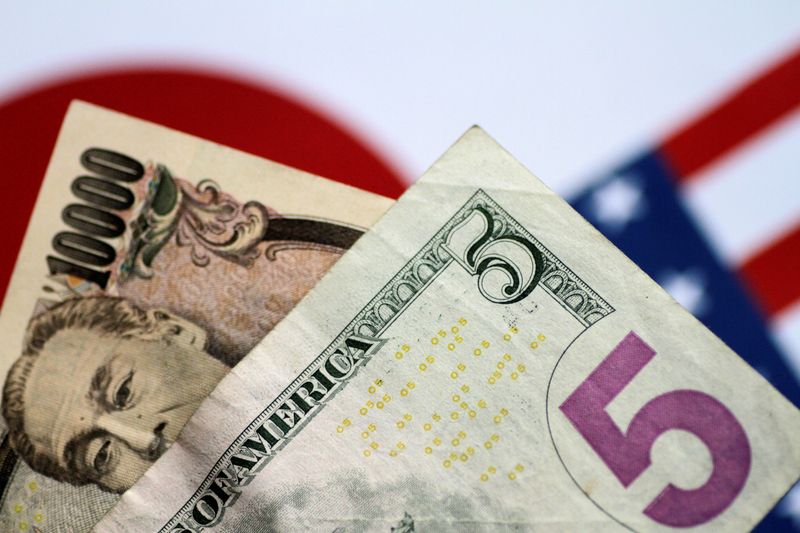By Ankur Banerjee
SINGAPORE (Reuters) – The U.S. dollar was soft on Thursday after the Federal Reserve opened the door for an interest rate cut in September, helping keep the yen pinned near its highest since March in the wake of a hawkish pivot from the Bank of Japan.
An action-packed Wednesday started with the BOJ raising Japan rates to levels not seen in 15 years, leading to traders reassessing popular carry trades before the Fed held rates steady but put rate cuts on the table as US inflation cools.
“If we were to see inflation moving down … more or less in line with expectations, growth remains reasonably strong, and the labour market remains consistent with current conditions, then I think a rate cut could be on the table at the September meeting,” Fed Chair Jerome Powell said.
Markets have been fully pricing in a 25 basis points (bps) of rate cut in September for some time and added to wagers of the Fed going big even after Powell said policymakers are not thinking about a 50-basis-point interest rate cut “right now.”
Traders are now anticipating 72 bps of easing this year.
Goldman Sachs strategists said Powell comments suggest the bar is not very high for a rate cut in September. “We continue to expect that the July inflation data will be favourable and think that even acceptable news would likely clinch a September cut,” they said in a note.
July inflation report is due to be released on Aug. 14. But before that, the focus will be on Friday’s government jobs report for July. It is expected to show that employers added 175,000 jobs during the month, according to the median estimate of economists polled by Reuters.
The , which measures the U.S. currency against six peers, was little changed at 104.02, having dropped 0.38% on Wednesday. The index fell 1.7% in July, its weakest monthly performance this year.
The euro last fetched $1.0825 after rising 1% in July, while sterling was at $1.2852 ahead of the policy decision from the Bank of England, where the central bank could cut rates but markets and economists remain far from certain.
The yen rose to 149.515 per dollar in early trading, its highest since mid-March after a 1% jump on Wednesday as the BOJ Governor Kazuo Ueda did not rule out another hike this year.
The central bank also announced plans to halve its monthly Japanese government bond (JGB) purchases to 3 trillion yen as of January-March 2026.
“I was surprised how hawkish the move was,” Ben Bennett, Asia-Pacific investment strategist at Legal and General Investment Management.

“I thought the recent yen rebound had reduced the pressure to hike. But the BOJ seem keen to get interest rates up and normalise policy. It probably leads to more yen strength, but it could weigh on the local economy and equity markets.”
The yen surged 7% in July, its strongest monthly performance since November 2022, after starting the month rooted near 38 year lows in large part lifted by bouts interventions by Japanese authorities that totalled $36.8 billion.





